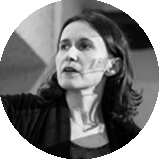Catherine Cavalin

2020-2021
SMI CNRS
Université Paris-Dauphine (PSL)
RESPIRA_ESPAÑA. Medical knowledge, patient experience, economic issues: respiratory health in Spain at the time of COVID-19
After being a Social Sciences teacher in the in “classes préparatoires aux grandes écoles”, Catherine Cavalin worked as a sociologist at the ministry of Health research and statistics department and at the Samusocial Observatory in Paris (France). Since 2018, she has been a permanent fellow researcher in Sociology at IRISSO (Interdisciplinary Research Institute in the Social Sciences, Paris-Dauphine University, PSL), a laboratory of the National Centre for Scientific Research (CNRS). She works on the diversity of health statuses and social health inequalities, which includes gender, labour and exposure to toxicants at work, as well as interpersonal violence. Catherine Cavalin’s research systematically encompasses a historical and sociological approach of knowledge. She particularly investigates the categories on which statistics are based, and the nosological categories that frame medical knowledge. Since 2012, she has been working on the borders between occupational and environmental health, and associated public health policies.
Projet de recherche
In the last twenty years, a silicosis outbreak has been raging across Spain. The international medical and epidemiological literature has been warning against this occupational health disaster. This situation is part of a broader picture: not only a global outbreak of silicosis, the disease known so far as affecting the miners’ lungs, but also a (re)discovery of the health hazards caused by crystalline silica (which is the most ubiquitous earth crust’s component), beyond silicosis alone.
Since 2012, Catherine Cavalin has been studying those hazards. Her research stay in the MIAS will allow her to interview physicians specialising in diseases of interest, physicians in charge of patient care or the public health response to the epidemic, entrepreneurs and workers affected silicosis or autoimmune diseases caused by silica dust. In collaboration with Prof. Alfredo Menéndez-Navarro, she aims to understand what specificities of medical observation and knowledge the Spanish situation may reflect, and to settle long-lasting collaborations with Spanish teams.
Sélection de publications
- (Alfredo Menéndez-Navarro, Catherine Cavalin, Montserrat García-Gómez, Alin Gherasim). 2021. “La remergencia de la silicosis como enfermedad profesional en España, 1990-2019”, Revista Española de Salud Pública, 95: e202108106.
- (Catherine Cavalin, Emmanuel Henry, Jean-Noël Jouzel, Jérôme Pélisse (dir.). 2020. Cent ans de sous-reconnaissance des maladies professionnelles, Paris, Presses des Mines, (https://www.pressesdesmines.com/produit/cent-ans-de-sous-reconnaissance-des-maladies-professionnelles/)
- (Catherine Cavalin, Alfredo Menéndez-Navarro). 2020. “L’émergence de la silicose des travailleurs de la pierre artificielle en Espagne. Le défi de nouveaux risques pour les politiques de santé au travail”, in Catherine Cavalin, Emmanuel Henry, Jean-Noël Jouzel, Jérôme Pélisse (dir.), Cent ans de sous-reconnaissance des maladies professionnelles, Paris, Presses des Mines, pp. 145-164.
- (Alain Lescoat, Catherine Cavalin, Valérie Lecureur, Patrick Jégo). 2021. “Vers une meilleure compréhension de l’étiologie des maladies auto-immunes systémiques : une maladie systémique doit-elle toujours être définie comme une « maladie inflammatoire diffuse d’origine inconnue » en 2021 ? Exemple de l’exposition à la silice crystalline. Éditorial”, La Revue de médecine interne, 42(4), pp. 233-236 (doi :10.1016/j.revmed.2021.03.005)
- (Fabrice Cahen, Catherine Cavalin, Émilien Ruiz). 2020. “Des chiffres sans qualités ? Gouvernement et quantification en temps de crise sanitaire”, Document de travail mis en ligne sur HAL-SHS, 29 mai (https://halshs.archives-ouvertes.fr/halshs-02659791)






